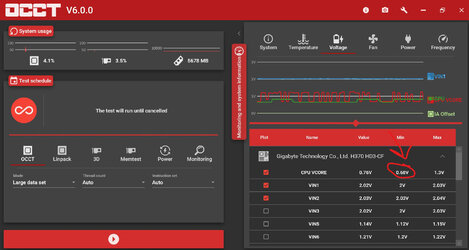- Joined
- May 30, 2020
So recently I've decided to upgrade to a non-overclocking rig, hoping for a cheap, hassle-free, all-auto, no worries setup.
I upgraded from Gigabyte Z170 HD3P + i5 6600k to Gigabyte H370 HD3 + i7 9700F.
Turns out I was wrong, since I started getting absolutely random abrupt reboots under no load, as if I pressed the reset button, no BSOD etc. I tested the hardware, disks, PSU (new Thermaltake Bronze 750W) and RAM (two Kingston HyperX @2666) are ok, the rig survived every stress test.
Still, it rebooted when simply browsing or leaving the PC idle, so I thought the CPU lacked power at some point. Turning off C-States did no good, as did changing PLL calibration.
What did help was pumping Vcore to 1.3V. The system became stable, but it produced too much heat and under load the CPU clock dropped to ~3 Ghz.
Now I set the voltage back to Auto, but disabled other settings, Voltage Optimization, Energy Efficient Turbo and Adaptive BCLK voltage. Works fine so far, about 24 hours.
So which piece of hardware is to blame here? Did anyone get this same configuration to work?
I upgraded from Gigabyte Z170 HD3P + i5 6600k to Gigabyte H370 HD3 + i7 9700F.
Turns out I was wrong, since I started getting absolutely random abrupt reboots under no load, as if I pressed the reset button, no BSOD etc. I tested the hardware, disks, PSU (new Thermaltake Bronze 750W) and RAM (two Kingston HyperX @2666) are ok, the rig survived every stress test.
Still, it rebooted when simply browsing or leaving the PC idle, so I thought the CPU lacked power at some point. Turning off C-States did no good, as did changing PLL calibration.
What did help was pumping Vcore to 1.3V. The system became stable, but it produced too much heat and under load the CPU clock dropped to ~3 Ghz.
Now I set the voltage back to Auto, but disabled other settings, Voltage Optimization, Energy Efficient Turbo and Adaptive BCLK voltage. Works fine so far, about 24 hours.
So which piece of hardware is to blame here? Did anyone get this same configuration to work?
